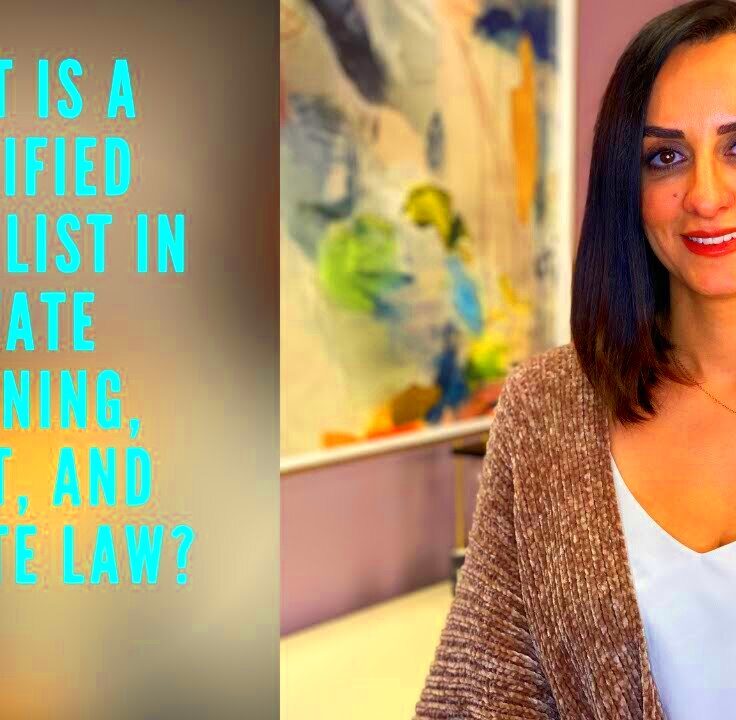Certified Specialist in Estate Planning Trust and Probate Law
When it comes to estate planning, trust, and probate law, having the right legal support can make a world of difference. A certified specialist in this field is a lawyer who has undergone additional training and certification to help clients manage complex estate-related issues. They are well-equipped to navigate the specific legal requirements involved in drafting wills, creating trusts, and administering estates. In this blog, we’ll explore what makes a certified specialist stand out and why it’s important to consider one for your estate planning needs.
Who Qualifies as a Certified Specialist?

Not every lawyer can call themselves a certified specialist in estate planning, trust, and probate law. In most jurisdictions, lawyers must meet specific requirements to earn this title, ensuring they have the expertise needed for complex cases. Here are some of the key qualifications:
- Advanced Education: A certified specialist must have additional training in estate planning, trust, and probate law beyond the general law degree.
- Experience: They must demonstrate substantial experience in handling estate-related matters, including drafting wills, managing trusts, and representing clients in probate court.
- Examination: Many states require specialists to pass a rigorous examination that tests their knowledge of estate planning laws and procedures.
- Peer Review: Often, the certification process includes a peer review component, where other lawyers and judges assess the candidate’s qualifications and ethical standing.
- Continuing Education: To maintain their certification, specialists must regularly complete continuing education courses to stay updated on legal changes.
This combination of education, experience, and ongoing learning ensures that certified specialists are highly qualified to guide clients through estate planning and probate processes.
Why Certification Matters in Estate Planning
Choosing a certified specialist for your estate planning needs can provide peace of mind, especially when dealing with the complexities of wills, trusts, and probate. Here’s why certification is so important:
- Specialized Knowledge: Certified specialists have in-depth knowledge of estate laws, helping you avoid costly mistakes and ensuring that your assets are protected.
- Complex Cases: If your estate involves significant assets, business interests, or complex family situations, a certified specialist is better equipped to handle these challenges effectively.
- Legal Compliance: Estate laws can vary from state to state, and they often change. Certified specialists stay current with these changes, ensuring that your estate plan remains valid and compliant.
- Reduced Risk of Litigation: A well-crafted estate plan reduces the risk of disputes or litigation after your passing. Certified specialists have the expertise to address potential issues upfront, saving your heirs from future legal battles.
- Trustworthy Advice: Certification signifies that the lawyer has been thoroughly vetted, giving you confidence that you’re receiving sound legal advice.
Ultimately, hiring a certified specialist means entrusting your estate to someone who has proven expertise in this complex area of law, ensuring that your wishes are properly carried out and your loved ones are protected.
The Benefits of Hiring a Certified Specialist for Your Estate
When planning your estate, hiring a certified specialist offers several advantages that can give you peace of mind. Certified specialists bring a higher level of expertise to the table, ensuring that every aspect of your estate plan is well thought out and legally sound. This can make a significant difference, especially when dealing with complex estates that involve multiple assets, business interests, or blended families.
Here are some key benefits of hiring a certified specialist:
- Tailored Solutions: Certified specialists can create personalized estate plans that suit your specific needs, taking into account your financial situation, family dynamics, and future goals.
- Expert Guidance: With their deep understanding of estate laws, certified specialists can provide clear guidance on tax strategies, trusts, and other legal tools that can protect your assets and ensure a smooth transfer to your heirs.
- Efficient Estate Administration: When it comes to probate or trust administration, a certified specialist can help streamline the process, ensuring your estate is managed efficiently and in accordance with your wishes.
- Reduced Legal Risks: An expert in the field can identify potential issues before they arise, reducing the likelihood of legal disputes or challenges after your passing.
- Continued Support: Certified specialists often provide ongoing support, updating your estate plan as laws change or as your circumstances evolve.
Hiring a certified specialist means your estate will be handled by a professional with proven expertise, offering you the best possible outcome for your estate planning needs.
The Certification Process for Estate Planning and Probate Lawyers
Becoming a certified specialist in estate planning and probate law is no easy feat. It involves rigorous training, examination, and ongoing education to ensure that the lawyer is well-equipped to handle the complexities of estate law. Here’s an overview of what the certification process typically looks like:
- Education Requirements: Lawyers must first complete a law degree and pass the bar exam in their respective state. Afterward, they must undergo additional coursework focused on estate planning, trusts, and probate law.
- Experience in the Field: To qualify for certification, a lawyer must demonstrate substantial experience in handling estate-related cases. This often includes drafting wills, creating trusts, and guiding clients through probate.
- Examination: Certified specialists must pass a challenging exam that tests their knowledge of estate law, including complex legal principles, tax implications, and state-specific regulations.
- Peer Review: The certification process often involves peer review, where other legal professionals assess the lawyer’s skills, ethics, and performance in estate-related matters.
- Continuing Education: Once certified, estate planning and probate specialists must continue their legal education to stay up-to-date with changes in the law. This ensures they can provide clients with the most current advice and strategies.
This comprehensive certification process guarantees that certified specialists are true experts in their field, offering clients a higher level of service and confidence in their estate planning decisions.
How Certified Specialists Can Help with Trust Management
Managing a trust can be complicated, and mistakes in trust administration can lead to serious legal and financial consequences. Certified specialists in estate planning and probate law are uniquely qualified to help individuals create, manage, and administer trusts, ensuring that everything is handled correctly from start to finish.
Here are some ways a certified specialist can assist with trust management:
- Creating a Trust: Certified specialists can help you choose the right type of trust based on your goals. Whether it’s a revocable trust, irrevocable trust, or special needs trust, they will ensure that the trust is structured to meet your needs and comply with legal requirements.
- Funding the Trust: One common mistake is failing to properly transfer assets into the trust. A certified specialist ensures that your assets—such as property, investments, and bank accounts—are correctly titled in the name of the trust.
- Trustee Guidance: If you’re serving as a trustee or have appointed someone to manage the trust, a certified specialist can offer guidance on the legal responsibilities involved. This helps prevent mismanagement and legal liabilities.
- Trust Administration: Once the trust is in place, a certified specialist will ensure that it is administered according to your wishes. This includes distributing assets, managing investments, and handling tax obligations.
- Dispute Resolution: If disputes arise over the trust, a certified specialist can represent your interests, offering legal solutions that can help avoid litigation.
By working with a certified specialist, you can be confident that your trust will be managed effectively and according to your plans, giving you and your loved ones the peace of mind that comes with professional guidance.
Key Differences Between Certified Specialists and General Practitioners
While both certified specialists and general practitioners are licensed to practice law, there are some key differences in their level of expertise and experience when it comes to estate planning, trust, and probate law. Knowing these distinctions can help you make an informed decision when choosing the right attorney for your needs.
Here’s a breakdown of the main differences:
| Certified Specialists | General Practitioners |
|---|---|
| Specialized Knowledge: Certified specialists have undergone additional training and education specifically in estate planning, trust, and probate law. They are experts in these areas and have passed a rigorous certification exam. | Broad Knowledge: General practitioners may handle a wide variety of legal matters, but their knowledge of estate planning and probate may not be as deep or specialized. |
| Experience: Certified specialists have extensive experience working with complex estate cases and must demonstrate this before earning certification. | Limited Experience: General practitioners may have some experience with estate planning, but they may not have handled as many cases or the same level of complexity as a specialist. |
| Up-to-Date Knowledge: Certified specialists are required to stay current on changes in estate law by completing continuing education courses. | Varying Knowledge: General practitioners may not always stay as up-to-date on the latest changes in estate law since their focus is spread across different legal areas. |
| Client Confidence: Hiring a certified specialist gives clients confidence that their attorney has proven expertise in estate law. | Client Assurance: General practitioners may not have the same level of proven expertise, which can lead to uncertainty, especially with complex cases. |
While general practitioners can offer valuable legal services, certified specialists bring a depth of knowledge and experience that is particularly important for estate planning and probate matters.
FAQs About Certified Specialists in Estate Planning Trust and Probate Law
There are many questions people have when it comes to hiring a certified specialist for estate planning, trust, and probate law. Below are some common FAQs to help guide you:
- What is a certified specialist in estate planning and probate law?
A certified specialist is an attorney who has completed additional training and certification in estate planning, trust, and probate law. They have passed a specialized exam and have proven expertise in these areas. - How is a certified specialist different from a regular attorney?
Unlike general practitioners, certified specialists focus specifically on estate law. They have a deeper understanding of the complexities involved and must complete continuing education to stay updated on legal changes. - Do I need a certified specialist for my estate planning?
While you don’t necessarily need a certified specialist, hiring one can provide significant advantages, particularly if you have a complex estate or specific needs that require expert attention. - How do I verify if an attorney is a certified specialist?
You can check with your state’s bar association or the governing body that certifies specialists in estate law. Many attorneys will also prominently display their certification on their websites. - What should I look for when hiring a certified specialist?
Look for experience, positive client reviews, and a clear understanding of your needs. Ask about their specific experience with cases like yours and how they approach estate planning and trust management.
These FAQs can help clarify some of the common concerns about working with a certified specialist and provide insight into why it may be the best choice for your estate planning needs.
Conclusion and Final Thoughts on Choosing a Certified Specialist
When it comes to planning your estate or handling probate matters, hiring a certified specialist in estate planning, trust, and probate law can make all the difference. These legal professionals have undergone rigorous training and certification, ensuring they have the knowledge and experience needed to handle even the most complex estate matters. Whether you’re creating a will, setting up a trust, or navigating probate, a certified specialist can provide the expert guidance you need to protect your assets and ensure your wishes are carried out.
Ultimately, the peace of mind that comes from working with someone who truly understands the intricacies of estate law is invaluable. Certified specialists can help you avoid costly mistakes, reduce the risk of disputes, and ensure your estate plan complies with all legal requirements.
If you’re considering hiring a certified specialist, take the time to ask questions, review their experience, and make sure they’re the right fit for your needs. By choosing a certified specialist, you’re making an investment in the future security and well-being of your loved ones.


